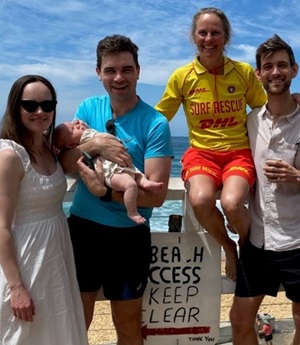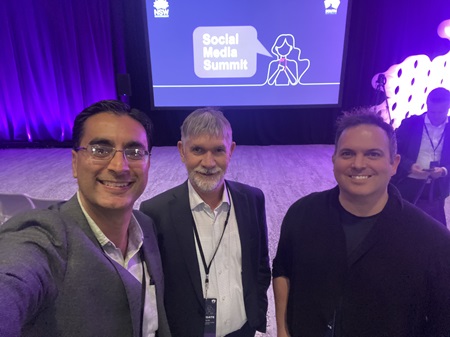The President's Message – 8 November 2024
Dear members,
You regularly tell us one of your most significant issues of workplace concern is your own health and wellbeing. This year the College has pivoted much of its policy and advocacy focus to workforce issues, reflecting your concern about ongoing stressors in your workplace.
We’ve established a Health and Wellbeing Committee and a Member Health and Wellbeing Strategic Plan 2023-2026, including a Wellbeing Advocates initiative.
In addition, many organisations are now appointing Chief Medical Wellness Officers. It’s a relatively new role, and we held a webinar explaining the position, and key takeaways for organisations and individuals.
I spoke with Dr Susannah Ward, a rehabilitation physician and Chair of the Health and Wellbeing Committee about the College’s work on this critical issue.
Note: If you would like to read the transcript, please click here, then copy and paste the following weblink into this automatic YouTube transcript generator: https://www.youtube.com/watch?v=09kgtc3DLTs
You meet physicians in all sorts of places. Outside of College and clinical duties, I’m a lifeguard. While on patrol at a closed beach during a recent weekend, I met a group of trainee physicians up from Sydney for a training weekend and chatted quite a bit with them.

Pictured (left to right): Dr Laura Dryburgh, a rheumatology trainee on maternity leave; her baby Flossie; husband Alex Tridgell, a gastroenterology Advanced Trainee (Westmead); myself; and Lachlan Sullivan, geriatrics and general medicine trainee in Western Australia who has a lot of knowledge about physician training in the bush.
While Laura was on maternity leave, she helped with the National Climate Strategy. She has taken two years off her training, one year to go to Oxford to do a policy degree as a John Monash Scholar to read a Master of Public Policy, and then a year in Sydney to work on the Climate Strategy as a Commonwealth employee.
It never ceases to surprise me how our extraordinary members make remarkable contributions to their communities.
Kind regards,
Professor Jennifer Martin
RACP President
As the first-of-its-kind, the Social Media Summit opened critical discussions around protecting children and young people on social media. Co-hosted by the NSW and SA Governments, RACP representatives attended the Summit to advocate for a strong public health approach and urging social media platforms to step up and create safer online spaces. The Summit showcased the power of collaboration for a safer digital future for the next generation.
We thank Professor Nitin Kapur, Dr Tony Gill, and Dr Paul Hotton for representing the College in this landmark gathering of Australian and global experts, policymakers, young voices, and community advocates.
If you would like to keep up-to-date with our ongoing advocacy in this space, follow us on X (Twitter), LinkedIn, Facebook and Instagram.

Pictured (left to right): Professor Nitin Kapur, President of the Paediatrics and Child Health Division; Dr Tony Gill, President-elect of the Australasian Faculty of Public Health Medicine; and Dr Paul Hotton, Chair of the Chapter of Community Child Health Committee.
The first annual report for the National Occupational Respiratory Disease Registry (National Registry) has been published on the Department of Health and Aged Care website. This report summarises data received to the National Registry for the first three months of its operation, as required by the National Occupational Respiratory Disease Registry Act 2023.
The Department of Health and Aged Care notes the low number of notifications received during the initial three months of operation which limits what new information can be gained from the data at this time. It recognises the notification of diseases which are not required under the Act demonstrates the willingness of physicians and patients to support the operation of the National Registry.
We are pleased to see the implementation of this Registry after our key advocacy on this.
The College made a submission to the House Standing Committee on Health, Aged Care and Sport’s parliamentary inquiry into the health impacts of alcohol and other drugs. The submission stresses the crucial importance of prioritising a health approach to alcohol and other drug use to effectively reduce harms for those who use drugs, their families and the broader community. It covers a broad range of issues including the need for state, territory and federal governments to invest in alcohol and other drug services to meet unmet demand, rebalance funding to prioritise harm reduction, prevention and treatment and implement evidence-based harm reduction measures as well and stronger regulatory measures to address the harmful role of alcohol on children, young people, families and societies.
Read the submission
 Findings from the 2024 New Fellow Survey are now available. Twelve per cent of New Fellows participated in the survey this year and provided feedback on their experiences of how well their RACP training prepared them for the transition to unsupervised practice. Thank you to those who shared their feedback.
Findings from the 2024 New Fellow Survey are now available. Twelve per cent of New Fellows participated in the survey this year and provided feedback on their experiences of how well their RACP training prepared them for the transition to unsupervised practice. Thank you to those who shared their feedback.
Key findings
The majority of New Fellows reported feeling prepared for unsupervised practice, especially in terms of competencies relating to communication, medical expertise, judgement and decision making and ethics and professional behaviour. However, the survey identified perceived gaps in competencies relating to health policy systems and advocacy, and research.
New Fellows reported experiencing challenges with:
- feeling confident in leadership positions
- transitioning to a less supported environment
- balancing new workload expectations
- finding consistent employment and job security
- navigating private practice.
Approximately one fifth of New Fellows reported that the transition to unsupervised professional practice was challenging, with over half of respondents suggesting that further College support in managing the transition would be helpful.
Receiving support from the RACP when needed, achieving a work/life balance and completing the Advanced Training Research Projects were identified as difficult aspects of training.
Results from the New Fellows Surveys and other external and internal feedback are used to inform and develop College initiatives such as a Health Policy, a Systems and Advocacy online course, and the rollout of supervisory training requirements. We’re now working across the RACP to see how we can further action these findings.
More information on the survey and a summary report of the findings can be found on the New Fellow Survey Page of the RACP website.
[Journal Club] Thrombolysis up to 24 hours after ischaemic stroke

Listen now
Thrombectomy for acute ischaemic stroke has undergone great advances in the last decade, but the expertise and technology is restricted to tertiary hospitals. Outside of large metropolitan centres, thrombolytic treatment can buy a patient time, but for almost 30 years the first line agent has remained unchanged. Alteplase is an analog of the human tissue plasminogen activator which activates plasmin to dissolve fibrin blood clots. For many years it was assumed that alteplase should be administered within three hours of symptom onset. It was a big deal in 2008, when research showed that the window could be safely broadened out to four and a half hours.
Today’s guests have over the intervening years been pushing the envelope even further, in an effort to help the more than two thirds of stroke patients who present after that threshold. In this podcast, Professors Bruce Campbell and Mark Parsons discuss a trial of the relatively novel agent, tenecteplase. The publication in the New England Journal of Medicine showed that tenecteplase could improve patient outcomes even if administered up to 24 hours out from a large vessel occlusion. The researchers explain the steps that led up to their study, and the importance of perfusion imaging to identify candidates with salvageable brain tissue.
Key reference: Tenecteplase for Ischemic Stroke at 4.5 to 24 Hours without Thrombectomy [NEJM. 2024]
Guests
- Dr Duncan Austin PhD FRACP MRCP (Cabrini Health)
- Professor Bruce Campbell PhD FRACP (Cabrini Health; Royal Melbourne Hospital; University of Melbourne)
- Professor Mark Parsons PhD FRACP, FAAHMS (Sydney Neurointerventional Specialists; Consulting in Neurology, Maitland).
Please visit the Pomegranate Health webpage for a transcript and supporting references. Log on to MyCPD to record listening and reading as a prefilled learning activity. Subscribe to new episode email alerts or search for ‘Pomegranate Health’ in Apple Podcasts, Spotify, Castbox or any podcasting app.
The RACP 2024 Member Statistics and Insights Report has just been released. This report provides an aggregated snapshot of College membership as at 30 June 2024 using member data from the College’s customer relationship management system.
The report displays a range of characteristics of the membership including demographic measures such as age, gender and location, as well as other characteristics such as largest training sites, specialty etc. Additional analysis has also enabled the report to include trend information about various characteristics of the membership over a number of years.
If you have any questions or feedback, please contact us.
Looking to develop valuable leadership skills for a clinical setting?
Early to mid-career Adult Medicine Division (AMD) Fellows are invited to attend our annual in-person AMD Leadership and Management Workshop, held on Saturday, 16 and Sunday, 17 November 2024 in the Sydney RACP office.
Physicians play a critical role in advancing health and healthcare delivery. Strengthening our skills in leadership, management, and innovation is essential to achieving this mission. This workshop provides practical insights into medical leadership with a focus on improving patient outcomes and community health.
Join us to learn from and network with fellow physicians and healthcare leaders from across Australia, all committed to enhancing their leadership capabilities and building high-performing teams.
Register now
 At the recent Australasian Professional Society on Alcohol and Other Drugs (APSAD) Conference in Canberra, our Evolve booth became a hub of knowledge and collaboration. We highlighted the Australasian Chapter of Addiction Medicine (AChAM) Evolve Top-5 recommendations to tackle low-value care in addiction medicine.
At the recent Australasian Professional Society on Alcohol and Other Drugs (APSAD) Conference in Canberra, our Evolve booth became a hub of knowledge and collaboration. We highlighted the Australasian Chapter of Addiction Medicine (AChAM) Evolve Top-5 recommendations to tackle low-value care in addiction medicine.
We enjoyed connecting with members passionate about shaping the future of healthcare by reducing unnecessary practices. Thank you to those who joined our Evolve Policy & Advocacy Interest Group. Curious about these game-changing recommendations? Check them out on the Evolve website.
More you may be interested in

RACP Benefits: exclusive savings on your lifestyle needs
Did you know that RACP Benefits gives you exclusive access to a range of discounts and offers from leading brands and retailers in Australia and Aotearoa New Zealand? Simply log in to the portal to start shopping and saving today. These special deals are exclusive to the College and made possible by our benefits partner, Member Benefits Australia.
As healthcare workers who dedicate our lives to helping others, it’s important to take the time to care for ourselves. We would like to remind everyone that it's okay to not be okay. If you need someone to talk to, you can reach out to the RACP Support Program. It's a free, 24/7 and completely confidential support service that is delivered externally through Converge International.
Whether you have something worrying on your mind, are finding getting out of bed to be a struggle, or just feel like talking to someone for helpful, judgement-free advice, this free support service may be just what you need.
Find out more